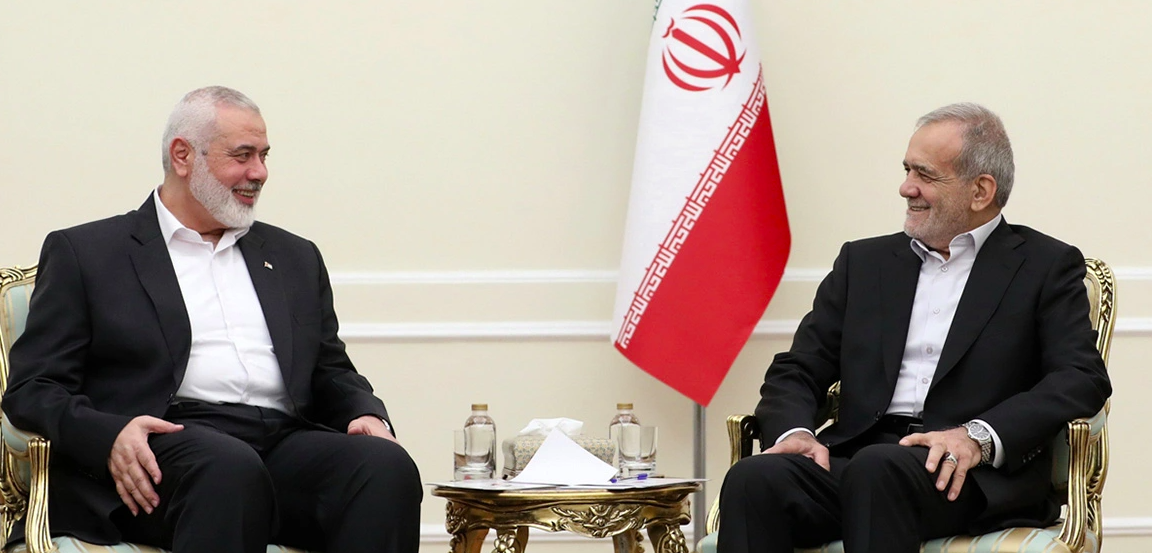Fears of a wider regional escalation have been raised following the assassination of Hamas political leader Ismail Haniyeh in Tehran, the capital of Iran, where he had traveled for the inauguration of the country’s new president, Masoud Pezeshkian.
Hamas described it as a “sly Zionist raid” against Haniyeh, during which one of his bodyguards was also killed. However, details about the exact circumstances of the deadly attack remain scarce.
All eyes inevitably turn to Israel, which has vowed to pursue and punish all Hamas leaders following the deadly attacks of October 7. These attacks resulted in 1,200 deaths and 251 people taken hostage.
Israel did not comment on the news of Haniyeh’s death. However, it was the second high-profile assassination attributed to Israel within hours, following an airstrike in Beirut in which the prominent Hezbollah military leader, Fuad Sukr, is said to have been killed.
According to Iranian state media, the attack on Haniyeh occurred around 2:00 AM on Wednesday, at a veterans’ residence in northern Tehran where Haniyeh was staying during Pezeshkian’s inauguration.
Initial reports suggest that Haniyeh and his bodyguard were killed when a rocket hit their residence. It is believed that Israeli aircraft launched the rockets from outside Iranian airspace.
The Iranian state news agency IRNA reported that Haniyeh was hit by a “guided aerial missile.” The assassination is under investigation, and results are expected to be announced later today, according to a statement from the Islamic Revolutionary Guard Corps.
Clouds of Retaliation
Ismail Haniyeh led Hamas’s political operations while living in exile in Qatar and was considered a key figure from the Palestinian side in advancing negotiations with Israel and in hostage exchanges. According to some analysts, his absence from the negotiating table and his sudden death might reset the talks between the two sides, at a time when tensions within Hamas are extremely high.
Moreover, the assassination of Ismail Haniyeh comes just hours after the Israeli strike in Beirut, which resulted in the death of Mohsen Sukr, also known as Fuad Sukr, the head of Hezbollah’s operational wing, as retaliation for the rocket attack on the Israeli-occupied Golan Heights that killed 12 people, including children.
In this context, the elimination of the leadership of both organizations within 24 hours by the Israelis “raises fears of further conflict in the region,” according to international news networks, leaving open the possibility of involvement from other groups in the bilateral conflict. This is particularly concerning as the confrontation between Israel and Hezbollah escalates, raising fears of a broader regional war, while battles between Israel and Hamas continue in Gaza, where the population is living in humanitarian crisis conditions.
It is worth noting that Israel has committed to “destroying” senior Hamas leaders following the October 7 raid near the Israel-Gaza border, which left 1,200 dead.
Political “Short Circuit”
At the same time, for the international community, Haniyeh’s assassination deprives the Palestinian delegation of a significant interlocutor, as Haniyeh was responsible for the organization’s political operations while in Qatar. From there, he was a key negotiator with mediators from Doha and the Egyptian delegation, aiming for the release of hostages and a ceasefire in Gaza.
For this reason, it is almost anticipated that his assassination will “freeze” progress on these issues, at a moment when Hamas declares itself “ready to pay various prices” in retaliation for the loss of its leader.
According to reports, the White House is aware of Haniyeh’s assassination but declined to comment immediately on the development. The Israeli side also admits that Haniyeh’s loss will have “significant influence” on ongoing negotiations, even though he was considered one of the main culprits behind the October 7 attack.
According to CNN, “The death of Hamas political leader Ismail Haniyeh is the most significant Israeli operation since October 7,” although last April, Israeli airstrikes had resulted in the deaths of three of his sons and four of his grandchildren. However, “Anyone who believes that targeting my children during negotiations and before an agreement is reached will force Hamas to retreat from its demands is delusional,” Haniyeh had said at that time, with peace talks taking a backseat following his loss.
From the Palestinian Authority’s side, “President Mahmoud Abbas strongly condemned the assassination of Hamas leader Ismail Haniyeh and considered it a cowardly act and a dangerous development. The President called on the masses and the forces of our people to unite, be patient, and steadfast in the face of Israeli occupation,” WAFA reported.
Ask me anything
Explore related questions





